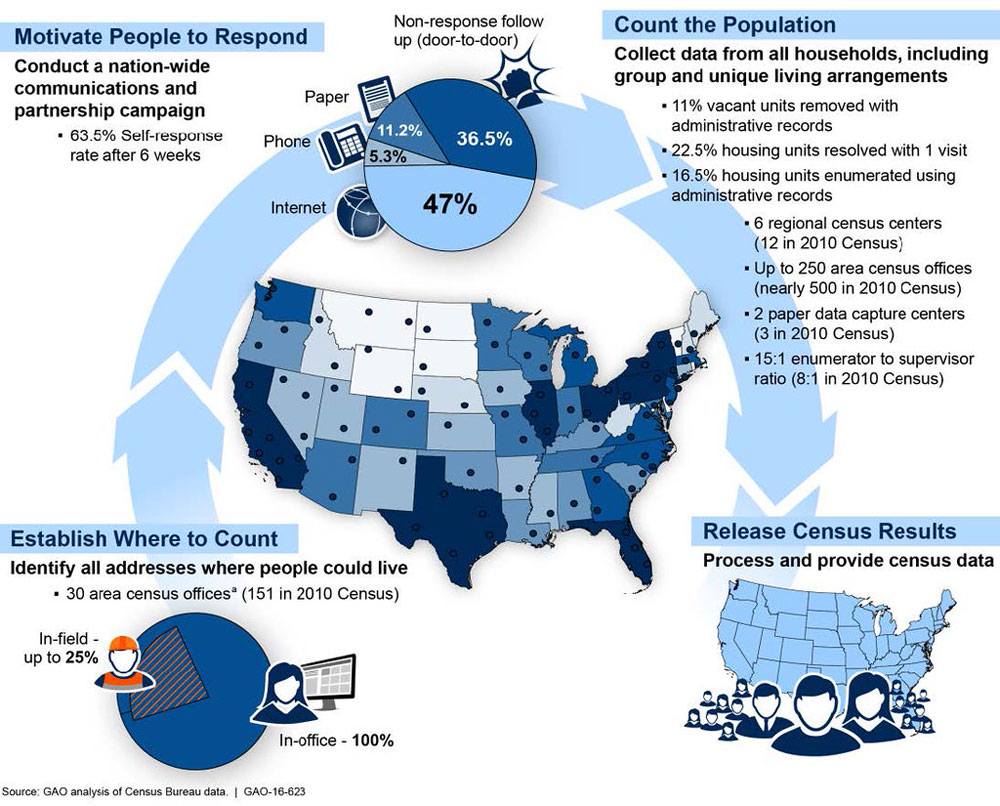
January 2, 2020; Daytona Beach News-Journal and the San Francisco Chronicle
The 2020 Census is less than three months away, with the survey planned to hit mailboxes on April 1st. The census directly determines federal representation in Congress and federal funding of states, as well as myriad other community investments. Across the country, nonprofits are using their community knowledge and might to ensure that the census is as accurate as possible, as they have much to lose if the count is off.
There is a justified nervousness that many US residents have around participating in the census. The 2019 Supreme Court case ruling that the question of citizenship should not be included in the Census was a victory from the perspective, by all accounts and political views, that it increases the probability of leaving fewer individuals uncounted. Still, it placed doubt and trepidation in the minds of many residents—particularly immigrants and refugees—reinforcing fears that they’d be identified and targeted under the current administration’s hawkish stance on immigration and citizenship. Indeed, last week, the Department of Homeland Security reported that it’d be sharing citizenship data with the Census Bureau, which would allow the bureaus to compare data including noncitizens’ full names, birth dates, addresses, Social Security numbers, and alien registration numbers. While government officials have stated that this data would only be used for “statistical purposes,” the high stakes of the data being used more broadly is likely enough to suppress participation from non-citizen and new citizen communities.
Sign up for our free newsletters
Subscribe to NPQ's newsletters to have our top stories delivered directly to your inbox.
By signing up, you agree to our privacy policy and terms of use, and to receive messages from NPQ and our partners.
It’s a confusing landscape for even those best informed on the policy positions and census process, and states have a growing fear that their funding will be reduced based on undercounted populations. In many states, such as Connecticut, Michigan and Florida, all states that could lose thousands of dollars per uncounted individuals, nonprofits are taking action to ensure that citizens are educated on what it means to be “counted.” For each person who’s not counted, states lose funds and are forced to spread their resources thin. Connecticut, for example, estimates a loss of $2,900 per uncounted individual to other states.
Why are nonprofits playing this role and not the state governments, given that both are knowledgeable about the implications of an undercount and have so much to lose? Well, nonprofits are a more trusted community voice. Edelman’s 2019 trust barometer indicated government was the least trusted institution, behind businesses, nonprofits, and the media. Nonprofits also have a stronger, more credible on-the-ground access to the people who might go uncounted.
Gian-Carl Casa, president and CEO of The Alliance, one of the Connecticut nonprofit groups that’s organizing “Count Me in 2020” workshops in the state, highlights the powerful role the nonprofit sector has to play. “Connecticut’s nonprofits have a special role to play in Census 2020,” he said. “Community nonprofits are trusted voices in the communities they serve and have the relationships needed to reach people in every neighborhood and region of our state.”—Danielle Holly













